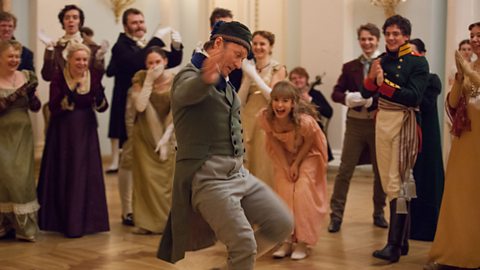 |
| Natasha and Andrei at the Ball |
The recent 2016 production of
War and Peace, Tolstoy's novel about the Napoleonic Wars from a Russian point of view, is perhaps one of the best television epics ever and certainly one of the most spectacular dramatizations of a Russian novel. The casting is perfection, the costumes and sets are sheer wonder, and the acting is stellar. Lily James delights as Natasha; Paul Dano is the most bumbling Pierre ever; James Norton brings a strong dose of nihilism to the brooding, melancholic Prince Andrei.
The waltz in which
Natasha and Andrei fall in love is like a lightning bolt which anchors the plot while shattering all preconceptions. Whether it is the ruin and building of empires or the ruin and building of families, the revelations about love, ambition, vanity, and the brevity of life are powerful enough to shake the viewer to the core. Here are some thoughts from Clive James of
The Guardian:
Sweeping scope, however, is only the second biggest thing that
Tolstoy was offering. He was also concerned with the psychology of his
principal characters, and your screenwriter, director and production
staff have to do something about that: principally, one hopes, by not
making a nonsense of the casting. If they can get that aspect right, the
screen can be filled with closeup scenes that will be better than you
can imagine.
Tolstoy’s gift is to draw upon what’s already in your head. But in
your head there might be no Pierre Bezhukov except the dolt you see in
the mirror, and over him you will always cast a gloss, usually by
imagining you are really the broodingly taciturn Andrei Bolkonsky. On
the page, Tolstoy’s limitation is you. On screen, the writer and
director can get you into less restricted territory.
After Pierre (played in the BBC adaptation by the American actor Paul Dano,
with a faultless mastery of the whole range of dithering) came into his
gigantic inheritance and set off to inspect his holdings with a view to
spreading justice and thereby improving the world, there was one little
scene that perfectly sums up his character. Noticing a woodpile stacked
against a hut, and two or three bits of wood still lying around the
chopping block, Pierre picks up the two or three bits and adds them to
the pile. Then he dusts his hands and lies down, plainly to dream about
the sanctity of honest labour.
In half a minute you have had it proved to you that Pierre’s
ineffectual sensitivity will always sabotage his ideals. From both the
adapter, Andrew Davies,
and the director, Tom Harper, this is sterling work: I marvelled at it,
and forgave Davies his earlier, almost fatal boldness in making
Pierre’s bad choice of wife, Hélène (Tuppence Middleton), a livelier
character than Natasha (Lily James). Besides, Natasha revved up nicely
in the later stages, and I quite saw how her impatience to get her sex
life started might have impelled her to seek initiation elsewhere when
Andrei (James Norton) so strangely obeyed his mad father and put off the
marriage for a year. (Read more.)
 |
| Count Rostov entertains |
|
 |
| At Home with the Rostovs | | |
|
 |
| Natasha does penance |
|
|
 |
| Pierre marries Hélène |
Here is my broadcast about how Napoleon viewed Louis XVI and Marie-Antoinette.
Share



















1 comment:
One to get on Blu-Ray!
Post a Comment